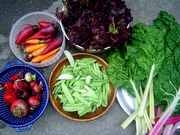

|
| Vegetable Varieties for Gardeners is a citizen science program
|
|
|
|
'Minnesota Midget' Melons |
| |
| Sub-Category: |
Muskmelon/Cantaloupe
Bush
|
| |
|
| Sub-Category 2: |
| | Description: |
Compact 3-foot vines with 4-inch fruit.
|
| Days To Maturity: |
60
|
| Seed Sources: |
Seed Savers Exchange - updated in 2014
|
| |
| Rating Summary |
| |
Overall: (3.7 Stars)
Taste: (3.8 Stars)
Yield: (3.7 Stars)
Ease/Reliability: (3.3 Stars) |
| |
| Reviews |
| |
Login to share your Review of Minnesota Midget.
Number of Reviews: 6
KEY: O=Overall Rating, T=Taste, Y=Yield, E=Ease
Reviewed on 08/15/2012 by
Little Minnie
- An experienced gardener
|
 Overall Overall
 Taste Taste
 Yield Yield
 Ease Ease
|
Sherburne, Minnesota, United States
Frost Free Season: 123 - 143 days
Soil Texture: Sand
Garden Size: Large - More than 1,600 square feet (40' x 40')
Sun Exposure: More than 8 hours per day
|
| Very early and very productive but you will have a glut of small melons all in the same week. Plants early on showed a brown dried up leaf disease probably due to problems with the drip lines. They produced a dozen or so per plant I suppose all in one week and varied in size from an orange to a grapefruit. Not exceptionally sweet but a nice treat in early August. |
| |
|
Reviewed on 01/26/2011 by
GABrownThumb
- A novice gardener
|
 Overall Overall
 Taste Taste
 Yield Yield
 Ease Ease
|
Hall, Georgia, United States
Frost Free Season: 183 - 203 days
Soil Texture: Clay
Garden Size: Small - Less than 400 square feet (20' x 20')
Sun Exposure: More than 8 hours per day
|
| My vines ran a bit more than 3 feet, but were pretty compact compared to most melons. They were trouble-free and productive, bearing sweet fruit that were about 4-6". |
| |
|
Reviewed on 10/16/2008 by
blujen
- An intermediate gardener
|
 Overall Overall
 Taste Taste
 Yield Yield
 Ease Ease
|
Sedgwick, Kansas, United States
Frost Free Season: 143 - 163 days
Soil Texture: Clay
Garden Size: Medium - 400 square feet to 1,600 square feet
Sun Exposure: More than 8 hours per day
|
| This melon was the first to produce for me, and produced melons from 1 to 4 pounds, for a total of nearly 40 pounds from one plant over the growing season. The smaller melons were good for a single serving, and are sweet and edible to the rind. The flavor was very sweet and musky, but not alot of the heavy flavor of some other varieties. It was a favorite of my friends, who all demand I continue to grow it! |
| |
|
Reviewed on 08/14/2007 by
MAldrich
- A novice gardener
|
 Overall Overall
 Taste Taste
 Yield Yield
 Ease Ease
|
Greenville, South Carolina, United States
Frost Free Season: 123 - 143 days
Soil Texture: Clay
Garden Size: Medium - 400 square feet to 1,600 square feet
Sun Exposure: More than 8 hours per day
|
| I was not impressed with this variety. It was my last melon to ripen. The melons were slightly bigger than golf balls with three spoonfuls of flesh. Each plant only had 1 or 2 melons. I'm not sure whether it's poor performance was due to the heat and the length of my season or the drought or just the nature of the plant. They tasted fine, but they don't seem worth it to me when I can grow so many long season melons. |
| |
|
Reviewed on 02/15/2007 by
Sher0462
- An experienced gardener
|
 Overall Overall
 Taste Taste
 Yield Yield
 Ease Ease
|
Converse, Wyoming, United States
Frost Free Season: Fewer than 103 days
Soil Texture: Not Sure
Garden Size: Large - More than 1,600 square feet (40' x 40')
Sun Exposure: More than 8 hours per day
|
| Here in central WY, this is one of a very few that we are able to ripen. They are small but quite sweet. |
| |
|
Reviewed on 04/24/2006 by
danceswithferrets
- A novice gardener
|
 Overall Overall
 Taste Taste
 Yield Yield
 Ease Ease
|
Greenville, South Carolina, United States
Frost Free Season: 163 - 183 days
Soil Texture: Clay
Garden Size: Small - Less than 400 square feet (20' x 20')
Sun Exposure: More than 8 hours per day
|
| It's a nice, compact plant, and seems to bear well. You will get a nice crop of small, early melons. The flavor was only so-so, but it was a rainy year. |
| |
|
|
|
|
Vegetable Varieties for Gardeners is a citizen science program, © 2004-2024, All Rights Reserved
Cornell Garden Based Learning, Cornell University College of Agriculture & Life Sciences, Horticulture Section
|






 VVfG home
VVfG home
 Overall
Overall Yield
Yield Overall
Overall Yield
Yield